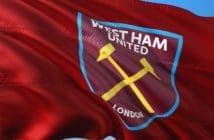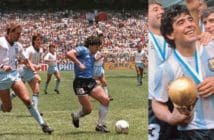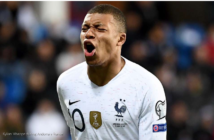After 62 games, some wonderful some not so, we finally the know the identities of the two nations who will contest the biggest occasion in world sport, the World Cup final. The Netherlands will play Spain and whoever emerges victorious, a new name will appear on the trophy and the Roll of Honour. Neither has ever won the cup before, and this is Spain’s first ever final.
That said neither nation is new to the big occasion. Spain are current European Champions, having emerged from decades of ‘talent without trophies’ to beat Germany 1-0 in the Final Ernst Happel Stadium in Vienna in 2008. This prompted many to predict that an era of glory finally awaited them, on a par with esteemed club sides Barcelona and Real Madrid. The next opportunity came in the slightly unesteemed Confederations Cup, but the longest unbeaten record in international football was derailed by the United States.

Xavi will Spearhead Spain's Midfield
Joe Armand
Then came their World Cup qualifying campaign in which they, like the Dutch, managed an incredibly rare and difficult feat. Spain played 10 games and won them all in a group that included Bosnia-Herzegovina, Turkey, Belgium, Estonia and Armenia. 28 goals were scored and five conceded, a remarkable achievement in a group that lacked a discernible minnow along the lines of a San Marino or an Andorra. Three of those five goals were conceded after Spain had long since qualified two in Bosnia, in a game Spain still won 2-5.
To that five goals conceded in twenty, we can now add the two conceded in six World Cup games, making a total of seven goals conceded in 16 games in this competition.
Their defence is based therefore on the rock solid foundation of La Liga players Gerard Piqué, Carles Puyol, Joan Capdevila, Sergio Ramos and of course goalkeeper Iker Casillas. Between them, they have missed only 19 minutes of Spain’s World Cup amassing therefore 3221 out of a possible 3240 available minutes to Vicente del Bosque’s back five. In front of them Sergio Busquets and Xabi Alonso have missed only 29 and 34 minutes respectively. In short, there is a telepathy and understanding, on top of a large degree of pure talent behind the numbers.
Up front David Villa has scored five of their seven in this tournament as Fernando Torres has suffered from what the English media has termed the blight of the stars by which they mean current of former EPL stars, assumed by them to be the best ion the world because they play in the wealthiest league. As Torres, Wayne Rooney, Cristiano Ronaldo and Didier Drogba have become almost irrelevant to the world’s biggest show, it is the stars of La Liga who have made the global impact. All but 370 minutes of Spain’s six games have been played by current La Liga stars.
(That is a recurring theme. All of Germany’s successful third placed squad play in the Bundesliga. Uruguay’s squad is a total hotch potch with twelve different leagues being represented though not the EPL. That said, both Italy and England drew entirely from their own cash rich leagues and look what happened to them.)
One oddity of this final, other than finally Europe will crown a winner on another continent, is that both sides conform to a stereotype of the other’s national character. Spain are well organised, laid back and function well as a unit. The Netherlands side is replete with unpredictable and combustible stars.
None perhaps embodies this more than the 26-year-old Bayern Munich winger Arjen Robben. Robben arrived in South Africa injured and missed the first two games against Japan and Denmark. However given that the Dutch won both of those comfortably, it seemed not to matter and Robben has benefited from being fresher as a result.
To diverge for a little while staying on the subject of freshness, the Dutch also qualified with a 100% record. But it was far less an achievement than Spain’s. Firstly, they had the sole European group of just five teams, as opposed to the six in each of the others. Therefore they had just eight games and won them all in a pitifully weak group where Norway, Scotland, Macedonia and Iceland provided the opposition. Fox Soccer Channel’s Bobby McMahon described Egil Olsen’s side as “the worst Norwegian side for 40 years” and they beat Scotland 4-0. (What he said about the Scotland side is unprintable).
In the European qualifying eight of the nine sides finishing second would qualify for a play-off round. Only the second placed side with the worst record would miss out. That side came from this group.
Then the draw was made for the Finals and the Dutch struck lucky again, with Japan, Cameroon and Denmark as opponents. After cruising through that group with three more wins, they drew another plum tie in Slovakia. After winning that more comfortably than the 2-1 score suggests, they finally met their biggest challenge in tournament favourites Brazil. They won that memorable game 2-1 (Orange Glee State) and then faced Uruguay, who they also beat somewhat more comfortably than the 3-2 scoreline suggested.
So they arrive at the final with 14 consecutive wins in competitive matches with 29 goals for and six against.
They have dangermen other than Robben. Robben’s Bayern were beaten in the Champions League final by Inter Milan. Inter’s Wesley Sneijder has scored five of the eleven Dutch goals this tournament and proven too hot to handle for every defence he has come up against although oddly midfield hard man Mark van Bommel is the World Cup’s second most fouled player after Japan’s Keisuke Honda. Honda is also the cup’s dirtiest player, committing 19 fouls incidentally.
Giovanni van Bronckhorst, Wesley Sneijder and Mark van Bommel are the engine room of this highly capable side. In the six games so far, they have played 1008 passes. Van Bommel has a completion rate of 66% for long passes alone, which is remarkable. 2/3of the time he puts the ball deep into opposition territory it lands at the feet of a colleague already standing in a threatening situation. There it would have been gathered by Sneijder but more probably by Arsenal’s Robin van Persie, one of five EPL players in the Dutch squad.
Van Persie however has had a poor World Cup so far. His pass completion rate is less than 60% and he has been caught offside eight times, more than twice the number of any other Dutch player.
At the back. the Dutch have been somewhat more generous than Spain. A back line composed of Hamburg’s Joris Mathijsen, Everton’s John Heitinga, Feyenoord’s Giovanni van Bronckhorst and Ajax Amsterdam’s Gregory van der Wiel has allowed goals in each of their last four games to Cameroon, Slovakia, Brazil and Uruguay. Maarten Stekelenburg behind them has been less than solid so it is a fair assumption that Spain will score at least once.
If the statistics and evidence of the last four weeks are to be believed, the Dutch will struggle to pierce Spain’s rock solid defence which seems impervious to the kind of errors others have displayed. So the Netherlands will have to produce and create something of their own, while relying on a less than solid back five to fend off David Villa, and a so far uninspiring Fernando Torres. Otherwise, Spain will flamenco dance comfortably to their fourth consecutive 1-0 win and the World Cup.
Only one thing is for sure. Someone will become the first ever European side to win the World Cup on another continent.
![Prost International [PINT]](https://prostinternational.com/wp-content/uploads/2021/08/PINTtFontLogoRoboto1536x78.jpg)



3 Comments
Enjoy the World Cup final. It should be an entertaining match if the officials don’t spoil it
Well, that’s the thing with football finals, they’re usually not that good, especially the big ones (world cup, european, champions league). both teams want to win so badly that it often gets locked down and very rough.
Like many millions of others-was looking forward to a great WC final -and supporting the Dutch at start of the game. By half time -due to the cynical and ‘ none Dutch’ approach (ie kicking Spain off the pitch) I switched my allegiance, The better team won in the end /which is good for football. I agree to some criticisms of the ref-in that 2 or 3 Dutch players should have been sent off, What does Johan Cruyff think of the Dutch performance???